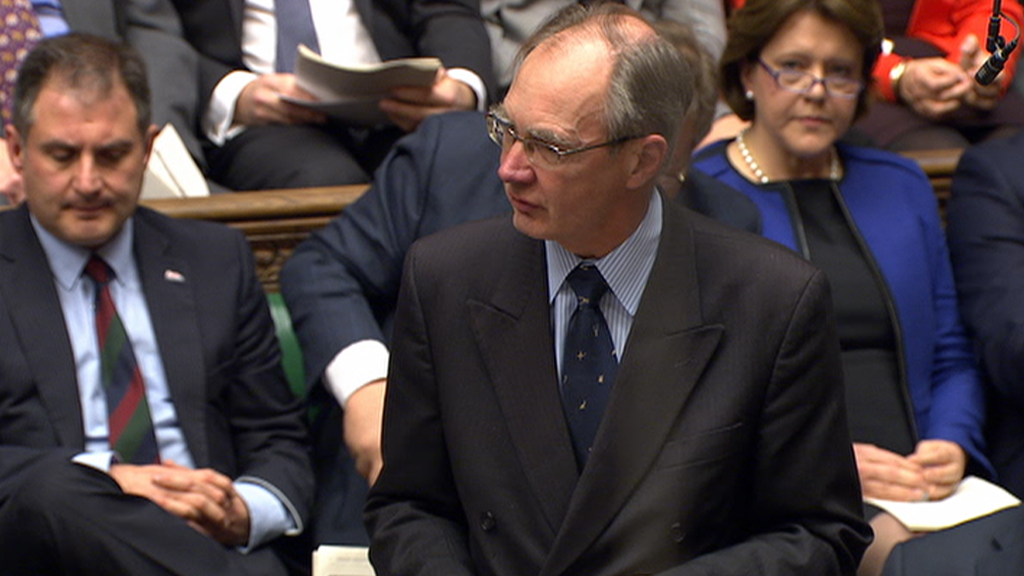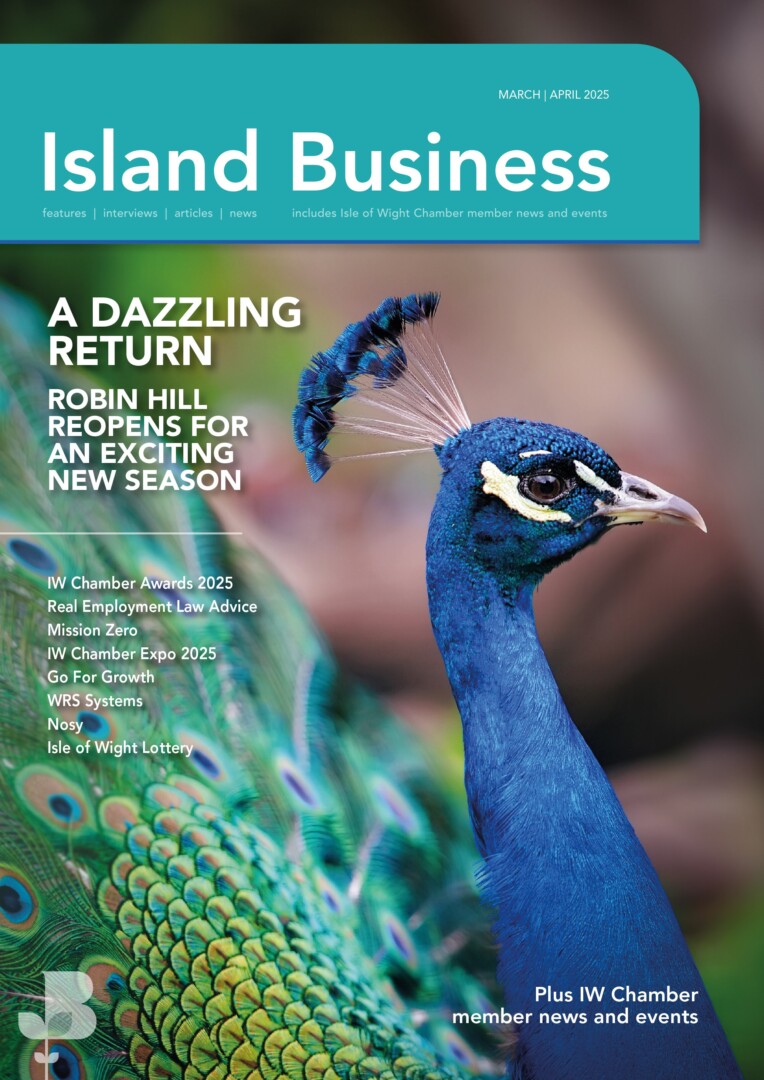Andrew Turner has been returned as the Island’s MP for the fourth time. We asked him about education, the ferries, a fixed link and how he will be representing the Island’s business community at Westminster in his next term of office.
Can you work more closely with the IW Chamber of Commerce and Island businesses?
I have enjoyed a positive and constructive relationship with the Chamber and look forward to working with them again over the next five years. The needs of businesses are varied and I do my best to help with any issues or problems that individual companies face. More generally I will look to see if there are further opportunities to support groups of businesses in innovative ways. For instance I set up the Island Technology Group a few years ago; under the able chairmanship of Geoff Underwood of IFPL it is tackling a number of problems that the members face. For instance they are working with local educators to help them offer the right courses to ensure that local youngsters have the skills needed to fill the vacancies they have. I have also supported the tourism industry and local food producers with the successful ‘Wight in Westminster’ days – working with Visit Isle of Wight. I’m looking forward to finding other ways of supporting our local businesses and economy – all suggestions welcome.
Businesses on the Island are under many different pressures. Many micro businesses would like to see a reduction in business rates. Town centres need investment and sometimes protection. How do you see your role when it comes to representing the Island’s economy at Westminster?
Business owners know how to spend their money far better than any Government, so we should leave as much of it as possible in their hands. That is my view on all taxes affecting the costs of doing business. During the last Parliament we reduced National Insurance bills, capped business rate rises and extended 100% small business rate relief. We are now planning a major review of business rates by the end of this year so that by 2017 they better reflect the needs of modern businesses. There has been some significant success; over the last five years 760,000 new businesses started up and around 1,000 new jobs were created every day – that is more than the other 27 EU countries combined – we want that to continue. Government must support businesses because they are the wealth creators of our economy, without a vibrant and successful private sector there would be no money to pay for the NHS or schools. In Westminster I always try to think particularly about the small and micro businesses that are such a feature of the Island’s economy.
What can you do to help improve education standards and the employability prospects for young people on the Island?
I will support in any way I can the Government and the Council as they work on this issue which is so important to the future of the Island. Progress is being made, but there is more to be done. Innovations such as the new Studio School will soon start to make an impact and as I said earlier, the Island Technology Group is doing some good work. Last year the Government provided £11m of funding through the Solent LEP for the new Composites Centre of Excellence; an exciting partnership project between the Isle of Wight College, GKN and other Island businesses. I’m really looking forward to seeing that move forward as these skills are highly sought after in marine, renewables and aerospace industries, where the Island has lots of experience and great potential. I’m not saying that everything in the garden is rosy, but I do know that many businesspeople feel that things are certainly moving in the right direction.
Many businesses will say that the Island’s economy is different to the mainland and they feel short-changed when governments lump us in with the South East region. What can you do to challenge the perception that Westminster doesn’t understand the unique aspects of the Island’s economy?
I certainly agree with the view that our economy is different to the mainland – and so does the Government! The needs of many areas of the country are different, that is why we set up the Local Enterprise Partnerships which now delivers the majority of public funding and support to businesses. The days of ‘I’m from Whitehall and I’m here to help’ are over – thank goodness. The Solent LEP have had some very high quality funding bids from Island companies and as a result there have been some great projects supported here – but I want to encourage them to do even more, particularly to let our smaller businesses know what help is available. I know the Chamber is also keen for this to happen, so hopefully we will be able to work together.
As an MP you’ve been very outspoken about the way the ferry companies operate. Some mainland-facing businesses will have welcomed this approach. Other tourism reliant businesses have seen it as negative publicity for the Island as a holiday destination. Will you continue to put pressure on the ferry companies?
I do feel that in the past we have been pretty poorly served as the ferry companies were sold off to financial companies rather than ferry operating businesses. Services declined and prices rose – with fairly predictable results on the Island’s economy and many individual businesses. However, last year I secured the Government’s support for a transport infrastructure taskforce. Part of its remit will be to look at how Island Line can be moved into some form of Community ownership. The taskforce will also look at the whole of our current transport set-up and future needs and how they can best be met. I am very pleased that all three ferry operators have welcomed this and have publicly said they want to co-operate – time will tell! I am convinced that the two main ferry companies need to look at a much longer investment timeframe than they have been, and hopefully recent announcements show there may be some movement in that area. I understand they need to make a profit – but that needs to be a fair return on investment; it can’t be a licence to exploit a lifeline service. I think it is fair to say that I work with the ferry companies where I can, but there are often tensions in the relationships – which is probably how it should be. Their responsibilities are ultimately to their shareholders – mine are to Islanders, who have a diversity of travelling needs, not just tourism, although of course is one vitally important part of the market. I will continue to put pressure on the ferry companies where I think it is needed.
Do you think a fixed link is a realistic prospect for the next ten years? Would it be good or bad for the Island’s economy?
I’m not a natural supporter of the idea of a fixed link, but I’m not against more research and investigations being carried out by those who support the idea. One of my objections is that it would mean that only one part of the Island would be linked to the mainland; to the detriment of other areas. I can’t see that the existing ferry routes would be viable if a fixed link were to be built. In order to give a full view on any proposal however I would have to see detailed plans – and of course there are none available.
What clear pledges can you make to support the Island’s business community for your next term as our MP?
I will support the new Government’s plans to deliver a strong and stable economy which of course all businesses need in order to flourish. I will also strongly support plans set out in our manifesto to cut red tape and the costs of doing business and treble the amount available for start-up loans. I’m also looking forward to the introduction of a new Small Business Conciliation Service to mediate in disputes, particularly over late payments – which many small business owners tell me is a problem. Other than that I’m really open to listening to the local business community to hear what they want from their MP. They’ve never been shy about telling me what they want in the past – I don’t suppose that will change now.
First published in the June 2015 issue of Island Business magazine.



